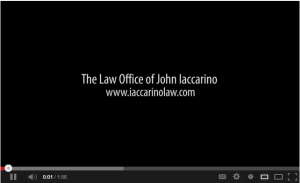Stress. Anxiety.Depression.

These are all feelings that many people with severe debt are facing as they ponder over what solutions that can turn to in order to fix their financial problems. For those facing serious debt that they are unable to resolve due to lack of financial resources, filing for bankruptcy can be the only solution to resolve their debt issues.
Deciding to file for bankruptcy is never an easy decision. Many clients come in with questions or misunderstandings as to how the bankruptcy process works, the different types of filings an individual can choose from, requirements, etc. Here at The Law Office of John Iaccarino, we have answered some of the most frequently asked questions regarding bankruptcy to help you decide whether or not filing for bankruptcy is the solution to solving your debt problems.
1. What are the advantages of bankruptcy?
Once discharged through bankruptcy your debts are erased; in other words you are no longer responsible for paying them.
2. What about my credit?
The fact is that when lenders or other creditors review your credit report they rank bankruptcy as the worst.
3. How long do I have to wait to rebuild my credit?
You can rebuild your credit immediately with a secured loan or credit card. In fact you can even obtain these items while going through the bankruptcy process.
4. How long does it take before my debts are discharged?
Chapter 7 takes between 3 to 8 months;
Chapter 11 can take from just under a year to many years;
Chapter 13 can take several months while trying to get your repayment plan approved. However, the actual discharge is not final until you’ve met the payment plan requirements which take from 36 to 60 months to complete.
5. How long until my credit gets back to the point where I might hope to get a regular credit card or mortgage?
Rebuilding credit depends on how aggressively you try to get back on track, but don’t figure less than 1-3 years. Remember, you can always get a secured credit card or a mortgage with a low loan to value (LTV) and high interest rate, sometimes even still in the middle of a bankruptcy.
6. How would I know if Chapter 7 is right for my situation?
If you have very few assets with no property and your assets can be exempted then Chapter 7 may be right for you as long as you have no other obligations such as court ordered alimony, child support payments, criminal restitution, non-dischargeable taxes, or student loans. (list of non-dischargeable items) Many national creditors prefer that you file Chapter 7 if they cannot recover at least 50 cents on the dollar.
7. Which bankruptcy chapter is the least expensive?
Chapter 7 is the least expensive because you do not have to pay off the debts. The next least expensive is Chapter 13 where you repay about 10 cents on the dollar, followed by Chapter 11.
8. Can I pick and choose which assets to put into a personal bankruptcy?
No. Every asset you own must be included in the filing. After filing you may choose to exempt some of your assets.
9. So I exempted my vehicle, what happens to it?
You didn’t actually exempt the vehicle (or any asset) you really only exempted the equity (if any) in the asset . So, if you have a loan for $17,000 on a vehicle worth $20,000 then you exempt $3,000. However this does not mean you get to keep the car free. You only keep the vehicle if you make payments on it.
On the other hand, if the situation was reversed and you owed $20,000 on a vehicle worth only $17,000 then you could choose to simply give the vehicle back and owe nothing. One of the advantages to filing bankruptcy.
10. What does reaffirm mean?
You become personally liable for the debt again. For instance, in the vehicle example above if you kept the car and made payments the creditor would probably want you to sign a new contract (reaffirm) for the vehicle.
11. What exactly can I exempt?
It depends on which state you live in. Most states allow the Federal exemptions but also have state exemptions that may be more favorable. See this list of Bankruptcy Exemptions – Federal and State
12. Does my personal bankruptcy affect my corporation?
No! But your shares go to the trustee and may restrict your voting and transferring privileges.
13. Can I file a personal Chapter 11?
Individuals may file. Chapter 11 – More info
14. Do I have to appear before a bankruptcy judge?
No, you will meet with a trustee and your creditors at a meeting called 341.
15. What is the trustee’s job?
Find assets with equity, liquidate them and then pay off the secured creditors. If any money is left then they also pay unsecured creditors based on priority. For a more in depth explanation see Chapter 7 “The Role of the Trustee”
16. What if I want to keep some non-exempted assets?
In most cases, you can buy them back from the trustee.
17. If I change my mind after filing can I get of or stop the bankruptcy?
Only the judge will decide if it may be dismissed or not. Even if you get the case dismissed your credit report will still show that you filed.
18. After I file bankruptcy can I still workout the non-exempt assets?
In Chapters 11 and 13 you may negotiate with your creditors out of court. In a Chapter 7 you may do a workout if the trustee abandons the property.
19. What does it mean when a trustee abandons property?
When the liquidation value of an asset cannot pay off the secured creditors, the trustee “abandons” it, or simply gives it back to the debtor. Although you’ve been discharged from the obligation, if a workout can not be achieved or payments made, you’ll probably lose the property at a foreclosure.
20. I thought bankruptcy stopped foreclosure? Can they still take my house?
When you file Bankruptcy, you receive an “automatic stay” on court actions such as foreclosures and sheriff’s sales. A creditor can still go into court and ask the bankruptcy judge for a “relief from stay”, and if granted the creditor can proceed with court action to foreclose.








